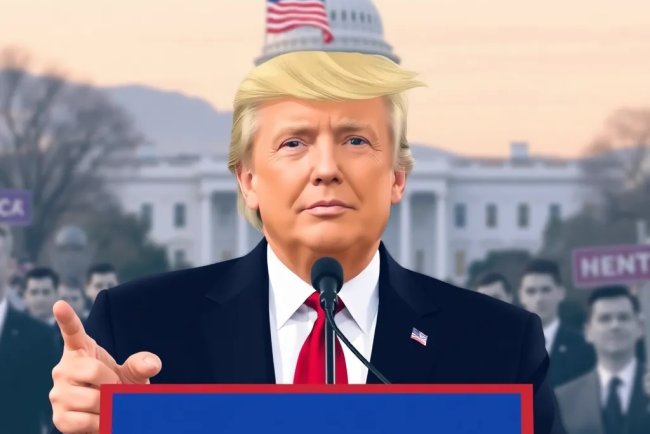Trump’s Presidency: A New Era for Cryptocurrency Regulation
Trump's election victory may reshape the cryptocurrency landscape, fostering a more favorable regulatory environment and boosting market confidence.

On Wednesday morning, Donald J. Trump secured a second presidential term, marking a remarkable political resurgence. This victory is also significant for the cryptocurrency sector, which had actively supported his campaign and contributed millions to various races. Analysts predict a more favorable regulatory environment for crypto innovation as a result of this election.
Bitcoin's Surge to $100K and Beyond
Following the election, Bitcoin experienced a surge, reaching an all-time high shortly after the polls closed. CoinDesk senior analyst James Van Straten anticipates that Bitcoin prices will continue to rise.
- Van Straten noted that Bitcoin is still below its inflation-adjusted price of $77,000, indicating it remains relatively affordable.
- Current Google search traffic for Bitcoin is low, suggesting the market is not yet in a state of euphoria.
- As the year enters its most bullish quarter, the upcoming deadline for institutional investment filings could reveal significant purchases of Bitcoin ETFs.
However, there are potential risks:
-
Trump's proposed tariffs on China may lead to increased consumer prices and elevated bond yields, which could negatively impact risk-on assets like Bitcoin.
Implications for Tether (USDT) and Circle (USDC)
Trump's win is seen as a positive development for Tether, the issuer of the largest stablecoin, USDT. The company's ties with Cantor Fitzgerald, a major financial player and Trump supporter, could provide Tether with more favorable conditions moving forward.
- Tether is currently under investigation for potential violations of sanctions and anti-money laundering regulations. While Trump's election may not end this probe, it could lead to a less aggressive pursuit compared to the previous administration.
- With a market cap of $120 billion, Tether is significantly larger than its closest competitor, Circle's USDC. This could make it increasingly difficult for Circle to catch up.
On the other hand, Circle may find a more viable path to going public as regulatory conditions improve.
Favorable Conditions for Solana (SOL) and Challenges for Ethereum (ETH)
The election results could also benefit Solana (SOL), the third-largest cryptocurrency. Analysts expect a shift in the SEC's leadership, which may lead to a less adversarial stance towards cryptocurrencies.
-
Financial firms might begin filing for spot SOL exchange-traded funds (ETFs), and regulatory clarity could enhance institutional engagement with Solana.
-
A more accommodating SEC could level the playing field for Ethereum, potentially allowing for competition in the smart contract space.
Broader Market Rally Expected
This year, price increases in cryptocurrencies have primarily been concentrated in Bitcoin and a few other assets. However, following the election, analysts predict a broader market rally.
-
The hope for improved regulatory frameworks may lead to increased adoption of a wider array of digital assets.
-
The CoinDesk 20 Index has already seen an uptick of 8% in the past 24 hours, with notable gains in assets like Uniswap, Solana, and Avalanche.
Decentralized Finance (DeFi) Gains Momentum
Decentralized finance (DeFi) assets have experienced relatively muted price movements, but this could soon change.
- Trump's campaign indicated a commitment to establishing the U.S. as a leading hub for cryptocurrency, which may lead to more favorable regulations for DeFi platforms.
- Clearer guidelines for token offerings could enhance operational conditions for DeFi projects in the U.S.
Traders are already responding positively, with Uniswap's UNI token rising 15% in the past 24 hours amid speculation about the SEC's future regulatory approach.
Potential Changes in SEC Leadership
In his acceptance speech, Trump emphasized his commitment to fulfilling campaign promises, which could lead to significant changes in the digital asset landscape.
- Historically, new presidents often appoint new SEC chairs, and Gary Gensler, who has been unpopular in the crypto community due to his stringent enforcement actions, may leave his position.
- While Gensler's term does not officially end until January 2026, his departure could pave the way for a new regulatory environment that is more favorable to cryptocurrencies.
Trump has also indicated support for commuting the sentence of Ross Ulbricht, the founder of Silk Road, and has voiced opposition to a central bank digital currency (CBDC).
What's Your Reaction?
















